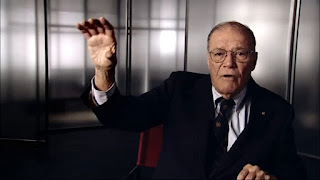Movie: The Fog of War (2003)
Method: Netflix DVD
 |
| That memory's gettin a bit foggy, too! |
Why Did I watch this?
I finally actually looked up when I added this to my Netflix DVD queue! January 10th, 2010. I don't know the exact date I pulled the trigger on Netflix, but I do that my first ever rental was received on January 8th, 2010. So this is an old one, one of the originals I put on my queue. I have no idea what first caught my eye about this. Maybe it was a fan of Errol Morris, although I've only seen The Thin Blue Line (1988) and The Unknown Known (2013), both way after I added this to my list. Maybe it was because it won the Academy Award for Best Documentary in 2003? It was kind of a big deal at the time, although certainly not a mainstream blockbuster. I positively have no idea how this got on my radar, but when I came up with the idea to do this series, I knew it had to be there!
What Did I know ahead of time?
I knew it featured Robert McNamara as a talking head interview and that he was a former Secretary of Defense for the United States of America. I knew it was a long talking head interview with him, similar to The Unknown Known. And I knew it jumped into some pretty heady political ideas. And Vietnam. That was about it.
How Was It?
This was pretty good. It is surely an Errol Morris film, the classical score (Philip Glass!), the archive footage, lots of tables and data, graphics, and a relatively simple talking head set up (it was actually decently complex), that gives off an easy one-on-one intimate feeling. The film has a framing device of eleven lessons learned from McNamara (indeed that's the Borat-like much longer title of the film).
They range from things he learned in the Air Force during WWII, as brief president of the Ford Motor Company, and most notably, as Defense Secretary for both Kennedy and Johnson during the Cuban Missile Crisis and the early stages of the Vietnam War. Where he's interesting is how much he's changed since those days yet you can see where he is very much the same.
He defends his Cold War actions as just that - part of a Cold War where they were constantly terrified of nuclear annihilation and posturing against the Soviet Union. You can remarkably understand the rationale for the Vietnam War, but also acknowledge that that rationale was flawed and misguided. It's a nice way of placating the inherent War Hawk nature with a man who knows that war is hell.
There's this constant pull and tug, though. He acknowledges at one point that he should probably be considered a war criminal, and mourns the hundreds of thousands of deaths that came about because of war. But he also focuses on statistical analysis, prioritizing bombing targets, plane efficiency, and empathizing with the enemy. It's that last bit that's interesting. They were successful in empathizing with Khrushchev and avoiding nuclear war in October of 1962. They were not successful in understanding how their enemy thought in Vietnam, and it's bold for him to say outright that their independence movement had nothing to do with China or Russia. Americans failed to understand that, so they failed in the war - namely, getting involved in the first place.
You can't help reading into this a little, considering it came out in 2003, on the eve of the Iraq war. In hindsight it makes us think less of what might be the most futile of all American Wars. Who were we posturing against? Who is our enemy? No one seems to know. McNamara admits that they had faulty intelligence from the Gulf of Tonkin (tho one real attack, one not so real) that pushed the US into further war. This is all straight up Iraq stuff. He says again and again to not repeat the mistakes of the past and considering historical context, it's impossible to miss what he's getting at.
I don't know much about McNamara, I know he wasn't all that popular in his day, what with being an architect of the Vietnam War and all, but it does seem like he was alone in the room pleading for caution and President Johnson did sack him for it. However, he is also clearly covering his own ass and his own legacy. It's hard to pin him down. It really did remind me a lot of Rumsfeld in The Unknown Known. You go in wanting answers, but these dudes aren't going to just lay down everything for us. They're squirmy. McNamara straight up doesn't answer a handful of questions. You walk away a little unsatisfied, but still with tremendous insight about how these men operate and how it affected the entire century.
Morris is a reliably good director, you can tell he lets his subject become comfortable, but he never lightens up on asking the tough questions. I enjoyed this quite a bit - I'm not sure if it deserved the twelve-year wait in my queue, but very happy at the end of it!
No comments:
Post a Comment